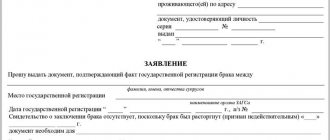Age required for marriage registration
The generally accepted “age of marriage” is 18 years. This is also the age of full legal capacity.
However, you can get married at the age of 16. But to do this, you must apply for permission from the local government, confirming the presence of valid reasons.
The most common reasons for lowering the marriageable age:
- Expecting a common child;
- Or his birth;
- Already established family relationships.
It is worth noting that parental approval for minors is not required.
In some constituent entities of the Russian Federation, it is possible to get married before the age of 16.
But for this you will need to submit an application to the central executive body addressed to the Governor. This can be done both by those wishing to get married and by their parents. But if there is a conflict between them, then this application will be considered only after the approval of the guardianship and trusteeship authorities.
For example, in Moscow and the region, the governor will give permission for registration provided that the bride is pregnant, has a common child, and also if there is a threat to the life of any of the future spouses.
The minimum age at which the registry office will accept an application is not established by law. But, based on the fact that the list of required documents includes a citizen’s passport, we can conclude that this threshold is 14 years.
Young people who get married before reaching the age of 18 become absolutely capable (emancipation occurs) and do not lose this status even after the divorce.
Article 13. Marriage age
1. The age of marriage is set at eighteen years.
2. If there are valid reasons, local government bodies at the place of residence of persons wishing to get married have the right, at the request of these persons, to allow persons who have reached the age of sixteen to marry.
(as amended by Federal Law dated November 15, 1997 N 140-FZ)
The procedure and conditions under which marriage, as an exception and taking into account special circumstances, may be permitted before reaching the age of sixteen years, may be established by the laws of the constituent entities of the Russian Federation.
Conditions for recognizing a marriage as invalid
The procedure for declaring a marriage invalid is carried out by the court. After making a decision, the court notifies the civil registry office and it makes a corresponding note in the registration book. The day from which the marriage will be considered invalid is the date of its conclusion.
The reasons why a marriage is declared invalid are very simple - the conditions for the legality of the union were initially violated:
- there was coercion into marriage, the person took this step not of his own free will
- any of the spouses has not reached the age of marriage, or has not received the necessary permission from the authorities;
- kinship, being in another marriage, incapacity;
- fictitious marriage - at least one of the parties did not have the goal of creating a family relationship.
In addition, if one of the spouses concealed that he is a carrier of HIV infection or a sexually transmitted disease, then the second has the right through the court to have the marriage declared invalid.
The Family Code and civil legislation regulate many issues relating to entry into, divorce and stay in a marriage. Each couple decides for themselves whether to register their relationship with a government agency or not. But when making a decision, it is important to know and understand what guarantees, rights and obligations follow.
Article 27. Recognition of marriage as invalid
1. A marriage is invalid if the conditions established by Articles 12–14 and paragraph 3 of Article 15 of this Code are violated, as well as in the case of a fictitious marriage, that is, if the spouses or one of them registered a marriage without the intention of starting a family.
2. A marriage is declared invalid by a court.
3. The court is obliged, within three days from the date of entry into legal force of the court decision to recognize the marriage as invalid, to send an extract from this court decision to the civil registry office at the place of state registration of the marriage.
4. A marriage is declared invalid from the date of its conclusion (Article 10 of this Code).
Family rights and responsibilities of spouses
The rights and obligations of spouses are divided into personal and property
Personal non-property rights:
- Right to equality.
- A husband and wife have the legal right to choose their profession, what to do, and where to live. This provision departs from the constitutional principle of equality of all citizens.
- All issues related to the spouses’ children (upbringing, education, etc.) must be resolved together; no one has more privileges in decision-making.
- Relationships within the family should be based on mutual respect and assistance.
- The right to choose a surname
Spouses can leave their premarital surnames, or they can do the following with them: take the surname of the husband or wife as a common one or add the surname of another to their surname. But the latter is impossible if the premarital surname is already double.
If, while married, a person wishes to change his surname (within the framework of Article 19 of the Civil Code of the Russian Federation), then this in no way affects the surname of the spouse.
After a divorce, both parties have the right to keep their married surname or restore their previous one.
Personal non-property and property rights of spouses
The rights and obligations of spouses arise from the date of state registration of marriage in the civil registry office.
On the day of marriage registration, the property and non-property rights of the spouses arise.
Non-property types include the following:
- the right to jointly resolve family life issues;
- the right to give consent to the adoption of a child by the other spouse;
- the right to divorce, etc.
Moreover, the presence of a right in one spouse gives rise to the presence of an obligation in the other. For example, one spouse has the right to give consent to the adoption of a child, while the other is obliged to ask permission, and vice versa. Property rights are of a different nature. Thus, all property of the spouses is divided into premarital and joint property. Property rights are divided into two types of legal relations:
- property relations;
- alimony relations (relations of mutual maintenance of spouses).
Property acquired by spouses while married is joint, and both spouses have equal rights to it. Spouses can enter into a prenuptial agreement and change the property regime. For example, according to the contract, the wife may own an apartment, and the husband may own a dacha and a car. Many couples, when registering a marriage, also draw up a prenuptial agreement, which guarantees the preservation of the interests of both spouses.
A marriage contract is one of the ways to guarantee the personal property rights of spouses
However, among the property acquired after marriage registration, some types of personal property are also distinguished:
- personal items (clothing, cosmetics, personal hygiene items, etc.);
- property acquired under gratuitous contracts (gift, inheritance, etc.).
In addition to rights, spouses have responsibilities not only to each other. Thus, when applying for a loan, spouses are required to notify their creditors about the marriage and the existence of a marriage contract. And also about any changes in the clauses of the marriage contract.
The creditor (creditors) of the debtor spouse has the right to demand changes in the terms or termination of the agreement concluded between them due to significantly changed circumstances in the manner established by Articles 451 - 453 of the Civil Code of the Russian Federation.
Right to marriage
Absolutely all citizens of the Russian Federation (subject to the necessary conditions) can be registered as spouses. This simple rule follows from the principles enshrined in the Family Code.
If applicants are denied because of their nationality, race, or religion, this will indicate discrimination, and they can go to court for protection.
Conditions and procedure for marriage
Marriage registration takes place at the civil registry office (registry office), in a formal or ordinary setting - at the choice of the spouses.
The bride and groom must be present at the wedding in person - this is a mandatory condition necessary to confirm the voluntariness of the decision.
There are situations in which a civil registry office employee will register outside the walls of the institution:
- when one of the future spouses is in the hospital or at home due to illness;
- when marriage is concluded with a citizen sentenced to imprisonment (or in custody).
The law does not provide for other reasons for exit registration.
The conditions for marriage are simple:
- persons wishing to legitimize the union act voluntarily;
- they have reached the required age;
- there are no obstacles.
Positive conditions
The rules for registering marriage are prescribed in the Family Code of the Russian Federation. To create a family union based on the voluntary desire of each participant in the marriage, it is necessary to collect some documents and submit them to the registry office, complete with a personal statement from the bride and groom.
Positive conditions of marriage:
- pleasant chores associated with preparing for the wedding ceremony;
- After marriage in the registry office, the husband and wife receive equal rights and responsibilities in family and household relations.
For many newlyweds, marriage is a good opportunity to always be close to a loved one, find a strong family, give birth and raise children together, build a life and enjoy every happy moment.
Negative conditions
Official registration of marriage with the civil registry office requires special preparation, as well as the implementation of certain rules regulated by the laws of the Family Code of the Russian Federation.
Negative conditions of marriage:
- According to the law, persons who have reached the age of 18, who are not in other registered relationships, who are not closely related, and who do not have mental disorders due to which one of the spouses is declared legally incompetent, can marry.
- To register a marriage at the registry office, you must provide a personal statement in form No. 7, as well as a passport proving your identity. If the bride or groom was previously married, a divorce certificate is also provided. In the event of the death of the former husband or wife of one of the applicants, a death certificate of the spouse will be provided.
- When submitting an application, you must pay a state fee (350 rubles) and provide a payment receipt along with the main documents.
Are witnesses required when registering a marriage?
The presence of witnesses at a wedding today is a good tradition that is observed by most newlyweds
From a legal point of view, the presence of witnesses at the marriage registration is an optional condition. This is nothing more than a tradition. However, many newlyweds prefer to invite their friends as witnesses, even when the wedding is limited to the registration procedure and no festive event is planned. But if you decide to invite witnesses, then you need to remember a few rules:
- witnesses must be adults;
- there must be two witnesses: a man and a woman;
- Witnesses do not need documents, since their data is not entered anywhere.
Witnesses are now needed as assistants to the bride and groom in organizing the wedding. For example, the witness will be responsible for transport (column, cortege, traffic jams, etc.), and the witness will help the bride with her outfit (hairstyle, train, etc.). In addition, the presence of witnesses helps the bride and groom morally. Friends of the young couple also control the delivery of wedding rings and documents to the registry office building.
Important: witnesses may not be allowed into the registration hall if the wedding is not a formal one. Innovations were introduced into the federal law in 2000. However, there are cases when, after the changes were accepted, witnesses were allowed to attend the painting procedure. It all depends on how busy the registry office is on the appointed day. For example, if there are few couples on the day of registration and there is no queue, you can persuade the registrar to allow witnesses into a special room along with the bride and groom.
Medical examination of persons entering into marriage
According to the law of the Russian Federation, citizens planning to enter into an official marriage are not required to undergo a medical examination. The only exception is HIV infection.
If one of the spouses is HIV-positive, he is obliged to notify his partner before marriage. If a partner hid his illness, which was revealed during the course of living together, the spouse can submit an application and the marriage will be annulled as soon as possible.
Article 15. Medical examination of persons entering into marriage
1. Medical examination of persons entering into marriage, as well as counseling on medical-genetic issues and family planning issues are carried out by medical organizations of the state health care system and municipal health care system at their place of residence free of charge and only with the consent of persons entering into marriage.
2. The results of the examination of a person entering into marriage constitute a medical secret and can be communicated to the person with whom he intends to marry only with the consent of the person who underwent the examination.
3. If one of the persons entering into marriage concealed the presence of a sexually transmitted disease or HIV infection from the other person, the latter has the right to apply to the court to declare the marriage invalid (Articles 27 - 30 of this Code).







